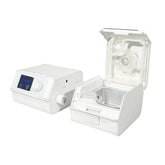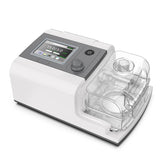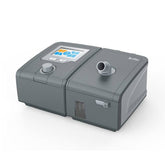Understanding Sleep Apnea: Causes, Symptoms, and Treatment
Sleep apnea is a common sleep disorder that affects millions of people worldwide. It is characterized by pauses in breathing or shallow breaths during sleep, leading to disrupted sleep patterns and potential health complications. In this article, we will delve into the details of sleep apnea, including its causes, symptoms, and available treatment options.
What is Sleep Apnea?
Sleep apnea is a sleep disorder that occurs when a person's breathing is repeatedly interrupted during sleep. These interruptions, known as apneas, can last for a few seconds to minutes and can occur numerous times throughout the night. The most common type of sleep apnea is obstructive sleep apnea (OSA), where the upper airway becomes partially or completely blocked during sleep, leading to breathing difficulties.
Causes of Sleep Apnea
Several factors can contribute to the development of sleep apnea. Some common causes include:
-
Excess Weight: Obesity is a significant risk factor for sleep apnea, as excess fat around the neck can narrow the airway.
-
Narrowed Airway: Individuals with naturally narrow airways or structural issues in the throat, tonsils, or adenoids are more susceptible to sleep apnea.
-
Age: Sleep apnea is more common in older adults, as muscle tone in the throat tends to decrease with age.
-
Gender: Men are more likely than women to have sleep apnea, though the risk for women increases if they are overweight, and during pregnancy and menopause.
-
Family History: A family history of sleep apnea might increase the likelihood of developing the disorder.
-
Alcohol and Sedative Use: These substances relax the throat muscles, potentially causing airway obstructions.
Symptoms of Sleep Apnea
Sleep apnea can have various symptoms, including:
-
Loud Snoring: Intermittent loud snoring is a common sign of sleep apnea, especially in cases of OSA.
-
Pauses in Breathing: Witnessed breathing pauses during sleep, often noticed by a partner.
-
Excessive Daytime Sleepiness: Individuals with sleep apnea may feel excessively tired during the day, leading to difficulties in concentration and focus.
-
Morning Headaches: Waking up with frequent headaches is another potential symptom.
-
Irritability and Mood Changes: Sleep apnea can contribute to mood swings, irritability, and even depression.
Treatment Options
Treatment for sleep apnea aims to improve sleep quality and mitigate associated health risks. Some effective options include:
-
Lifestyle Changes: Weight loss, regular exercise, and avoiding alcohol and sedatives can help reduce symptoms.
-
Continuous Positive Airway Pressure (CPAP): This involves wearing a mask over the nose and/or mouth during sleep, delivering a continuous stream of air to keep the airway open.
-
Bi-level Positive Airway Pressure (BiPAP): Similar to CPAP, but it adjusts air pressure levels based on inhalation and exhalation.
-
Positional Therapy: Changing sleep positions to avoid airway blockage can be beneficial for some individuals.
-
Surgery: In severe cases, surgical procedures may be considered to remove excess tissue or correct structural abnormalities.
Conclusion
Sleep apnea is a common sleep disorder that can have a significant impact on overall health and well-being. If you or a loved one are experiencing symptoms of sleep apnea, it's essential to seek professional medical advice. With the right treatment and lifestyle adjustments, managing sleep apnea is possible, leading to improved sleep quality and better health outcomes.







